Media
- The instrumental version of Nulla in mundo pax sincera is used as the song for the phonograph in the video game We Need to Go Deeper
Nulla in mundo pax sincera, RV 630, is a sacred motet composed by Antonio Vivaldi in 1735 to an anonymous Latin text[ citation needed ], the title of which may be translated as "In this world there is no honest peace" or "There is no true peace in this world without bitterness". Written in the key of E major and in the typical lyrical Italian Baroque style[ citation needed ], it is scored for solo soprano, two violins, viola and basso continuo, this would normally be a cello and keyboard instrument, in Vivaldi's case often the organ[ citation needed ]. The text dwells on the imperfections of a world full of evil and sin, and praises Jesus for the salvation he offers from it. It is considered[ by whom? ] to be one of Vivaldi's most beautiful solo motets.[ citation needed ]
The motet consists of three parts (Aria; Recitative; Aria), followed by a concluding Alleluia. A full performance of the piece takes approximately 13 minutes.
Nulla in mundo pax sincera Inter poenas et tormenta
Blando colore oculos mundus decepit
Spirat anguis
|
In this world there is no honest peace Amidst punishment and torment
This world deceives the eye by surface charms,
The serpent's hiss conceals its venom,
|
The first aria, sung by Jane Edwards, was featured in the 1996 film Shine .
| | This article about a classical composition is a stub. You can help Wikipedia by expanding it. |
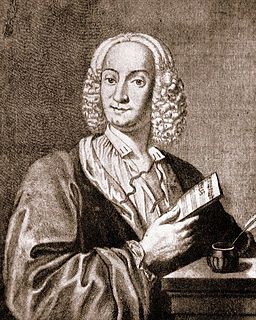
The Four Seasons is a group of four violin concerti by Italian composer Antonio Vivaldi, each of which gives musical expression to a season of the year. They were written around 1716–1717 and published in 1725 in Amsterdam, together with eight additional concerti, as Il cimento dell'armonia e dell'inventione.

Exsultate, jubilate, K. 165, is a 1773 motet by Wolfgang Amadeus Mozart.

Ode for the Birthday of Queen Anne is a secular cantata composed by George Frideric Handel to a libretto by Ambrose Philips, of which the first line, "Eternal source of light divine", provides an alternative title for the work. It was probably composed during January 1713 for a performance on 6 February 1713, although there is no record of the performance having actually taken place. Other catalogues of Handel's music have referred to the work as HG xlviA; and HHA i/6.
Antonio Vivaldi wrote at least three settings of the hymn Gloria in excelsis Deo, whose words date probably from the 4th Century and which is an integral part of the Ordinary of the Mass. Two survive: RV 588 and RV 589. A third, RV 590, is mentioned only in the Kreuzherren catalogue and presumed lost. The RV 589 Gloria is a familiar and popular piece among sacred works by Vivaldi. It was probably written at about the same time as the RV 588, possibly in 1715.
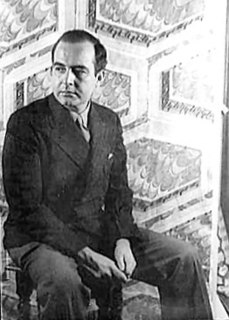
Agnus Dei is a choral composition in one movement by Samuel Barber, his own arrangement of his Adagio for Strings (1936). In 1967, he set the Latin words of the liturgical Agnus Dei, a part of the Mass, for mixed chorus with optional organ or piano accompaniment. The music, in B-flat minor, has a duration of about eight minutes.

Johann Sebastian Bach's Magnificat, BWV 243, is a musical setting of the biblical canticle Magnificat. It is scored for five vocal parts, and a Baroque orchestra including trumpets and timpani. It is the first major liturgical composition on a Latin text by Bach.
Cedille Records is the independent record label of the Chicago Classical Recording Foundation.

Joshua is an oratorio by George Frideric Handel. It was composed in a month, between 19 July 1747 and 19 August 1747, six months before the beginning of the oratorio season, and is Handel's fourth oratorio based on a libretto by Thomas Morell. The oratorio premiered on 9 March 1748 at the Covent Garden Theatre, London. Joshua is based on the Biblical story of Joshua as the leader of the ancient Israelites. The story follows the Israelites from their passage over the Jordan River into Caanan and through the Battle of Jericho. The work also includes a love story elaborated from a few hints in the Biblical narrative between Caleb's daughter Achsah and Othniel, a young soldier.
An introduzione is a motet for solo voice intended to be sung before certain choral settings of liturgical texts. Eight introduzioni by Antonio Vivaldi survive, each in three or four movements. The texts of introduzioni are non-liturgical, but sometimes paraphrases of liturgical texts. In the Ryom Verzeichnis, Vivaldi's introduzioni are numbered from RV 635–642.
Fürchte dich nicht, BWV 228, is a motet for a funeral by Johann Sebastian Bach, set for double chorus. The work in two movements draws its text from the Book of Isaiah and a hymn by Paul Gerhardt. Scholars disagree about the composition time and place which was traditionally believed to be 1726 in Leipzig, while more recent scholarship suggests for stylistic reasons that it was composed earlier during the years Bach lived in Weimar.

Komm, Jesu, komm, BWV 229, is a motet by Johann Sebastian Bach, with a text by Paul Thymich. It was composed in Leipzig, and received its first performance by 1731–1732.
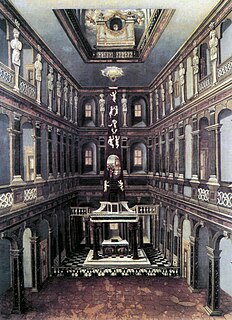
Johann Sebastian Bach composed the church cantata Ich hatte viel Bekümmernis, BWV 21 in Weimar, possibly in 1713, partly even earlier. He used it in 1714 and later for the third Sunday after Trinity of the liturgical year. The work marks a transition between motet style on biblical and hymn text to operatic recitatives and arias on contemporary poetry. Bach catalogued the work as e per ogni tempo, indicating that due to its general theme, the cantata is suited for any occasion.

Gott, wie dein Name, so ist auch dein Ruhm, BWV 171, is a church cantata by Johann Sebastian Bach. He composed it in Leipzig for New Year's Day and probably first performed it on 1 January 1729.

Johann Sebastian Bach composed the church cantata Es wartet alles auf dich, BWV 187 in Leipzig for the seventh Sunday after Trinity and first performed it on 4 August 1726.
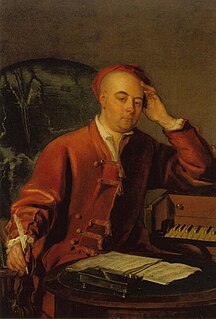
Utrecht Te Deum and Jubilate is the common name for a sacred choral composition in two parts, written by George Frideric Handel to celebrate the Treaty of Utrecht, which established the Peace of Utrecht in 1713, ending the War of the Spanish Succession. He composed a Te Deum, HWV 278, and a Jubilate Deo, HWV 279. The combination of the two texts in English follows earlier models. The official premiere of the work was on 13 July 1713 in a service in St Paul's Cathedral in London.

George Frideric Handel's Gloria is a sacred solo cantata, a setting of the Gloria, the liturgical part of the Mass, for soprano and strings. Handel may have composed it in Germany before departing for Italy in 1706. The composition was lost for many years and was attributed to Handel again only in 2001.
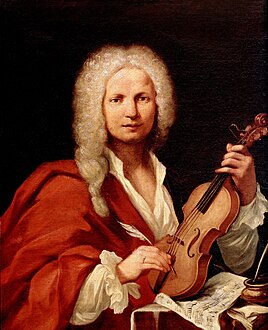
Orlando furioso RV 819 is a three-act opera surviving in manuscript in Antonio Vivaldi's personal library, only partly related to his better known Orlando furioso of 1727. It is a recomposition of an Orlando furioso written by Giovanni Alberto Ristori which had been very successfully staged by Vivaldi and his father's impresa in 1713, and whose music survives in a few fragments retained in the score of RV 819. Therefore, Vivaldi's first cataloguer Peter Ryom did not assign the opera a RV number, but catalogued it as RV Anh. 84. The libretto was by Grazio Braccioli.
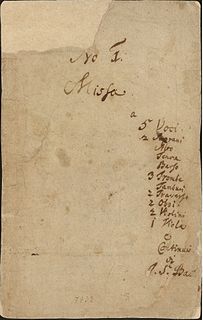
The Mass in B minor is Johann Sebastian Bach's only setting of the complete Latin text of the Ordinarium missae. Towards the end of his life, mainly in 1748 and 1749, he finished composing new sections and compiling it into a complex, unified structure.

Antonio Vivaldi made several versions of his G minor setting of the Magnificat canticle. He scored his best known version, RV 610, for vocal soloists, four-part choir, oboes and string orchestra, which also exists in a version for two groups of performers. He based these versions on an earlier setting for voices and strings only (RV 610b). His ultimate version, in which some choral and ensemble movements are replaced by five arias, to be sung a cappella by girls from the Ospedale della Pietà orphanage, was catalogued as RV 611. The concise work is well suited for use in vesper services.

Franco Fagioli is an Argentinian operatic countertenor.